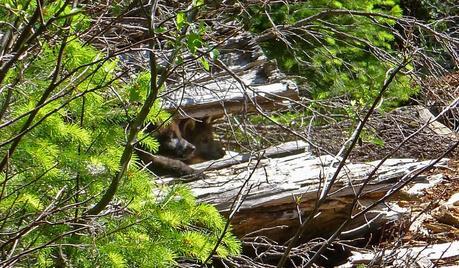Decision Comes Two Days After Wolf Pups Observed in Southern Oregon
by Center for Biological Diversity

Two of wolf OR7’s pups peak out from a log on the Rogue River-Siskiyou National Forest, June 2, 2014. Photo courtesy of U.S. Fish and Wildlife Service.
FORTUNA, Calif.— In response to a 2012 petition from the Center for Biological Diversity and allies, the California Fish and Game Commission voted today to protect gray wolves under the state’s Endangered Species Act. The 3-1 vote for protecting wolves comes two days after wildlife biologists observed two wolf pups in the Oregon portion of the Rogue River-Siskiyou National Forest that straddles the California-Oregon border. The pups, which are likely to be part of a litter of four to six pups, are the offspring of the wolf known as OR-7, which has made California part of his range for the past four years.
“This is a great day for wolf recovery in the West,” said Amaroq Weiss, the Center’s West Coast wolf organizer. “I’m just so thrilled that we have a new wolf family in southern Oregon and that these beautiful animals are finally getting protection in California. This is the first chapter in a longer story of wolves returning to California and living here in the wild.”
Wolves were once widely distributed throughout California but were eradicated from the state by a government-sponsored effort on behalf of livestock operators more than 80 years ago. In late 2011 a young male wolf from Oregon known as OR-7 crossed the border into California, becoming the first confirmed wild wolf in the state since the 1920s. OR-7 stayed in California for 15 months before returning to Oregon, but has crossed back into California several times.
After remote cameras captured several recent images of what appeared to be a black female wolf in the same area of southern Oregon known to be inhabited by OR-7, wildlife biologists suspected the wolves had mated, and on Monday confirmed the discovery of two pups.
Oregon’s growing wolf population has tripled in the past three years, and it is widely anticipated that more wolves from Oregon will make their way into California. OR-7’s journey to California involved his first dispersing westward across Oregon into the Cascade Mountains, then dropping south into California. Recently the tracks of another wolf were documented in the Oregon Cascades, the first since OR-7.
The fact that OR-7 has made California part of his range for parts of four consecutive years substantially increases the likelihood he will continue to explore the state with his newly formed family and that his pups could form packs of their own in California in the near future. “Wolves are at a critical moment,” said Weiss. “The federal government is proposing to strip federal protection from these animals across the country, including states like California where wolves are just starting to return. This makes state protection essential, and is all the more reason to celebrate this historic decision by the commission this and remarkable news about this new wolf family.”
The Center for Biological Diversity is a national, nonprofit conservation organization with more than 775,000 members and online activists dedicated to the protection of endangered species and wild places.

